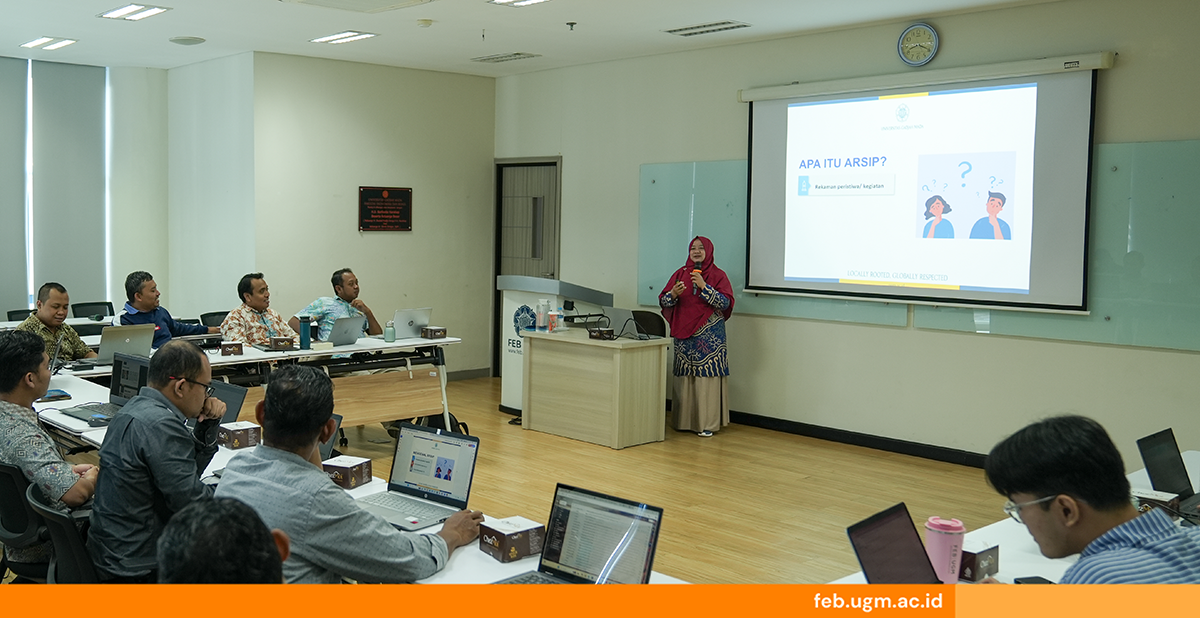
The Faculty of Economics and Business, Universitas Gadjah Mada (FEB UGM), organized an Archival Training for professional staff held over two days on February 5-6, 2025, on the 5th floor of the Pertamina Tower Building. The training aimed to enhance staff knowledge and understanding of archival management.
The Head of the Administrative Office of FEB UGM, Nur Bakti Susilo, S.E., Ak., CA., ASEAN CPA., emphasized the importance of this training to ensure a more effective and efficient archive management system.
“This is a crucial aspect. Although FEB UGM has largely adopted electronic archiving, we still need to learn how to manage textual or paper-based archives, covering the processes of entry, distribution, and disposal,” he stated.
The training featured expert speakers with an archival background, including Fitria Agustina, S.IP., M.Sc., Kurniatun, S.IP., Ully Isnaeni Effendi, S.E., M.Sc., Heri Santosa, S.ST.Ars., and Dr. Herman Setyawan, S.Pd., M.Sc., each presenting on different days. The speakers covered three main topics: Active Records Management, Organization of Unstructured Inactive Records, and Records Disposition.
One of the speakers, Fitria, highlighted that archiving is not solely the responsibility of designated archivists. Instead, it applies to all staff interacting with documents across various units and study programs.
“Daily records are best understood by users, including their function, utility, and required retention period. Therefore, collaboration and shared awareness are essential to ensuring efficient, structured, and institutionally aligned records management,” she explained.
She also emphasized that records management goes beyond merely organizing documents. Regulations and official documentation guidelines applicable within UGM govern it.
“Archival management must not be done carelessly. It is essential to ensure that every record is properly documented and complies with prevailing regulations,” she added.
Meanwhile, Heri pointed out that a clearly documented records list characterizes a well-managed archive.
“Simply organizing documents without systematic recording is insufficient to be classified as effective records management. Therefore, implementing archival classification in each department is a crucial step toward better-organized and accountable administration,” he explained.
Regarding the disposal of both physical and electronic records, Herman stressed the need to follow university guidelines. For instance, records that have exceeded their retention period must be disposed of according to established protocols to prevent unnecessary accumulation in storage spaces. “Keeping irrelevant records can hinder the management system and make document retrieval more challenging,” he stated.
In addition to theoretical presentations, the final session provided hands-on training led by Isti Maryatun, S.ST.Ars., Anna Riasmiati, S.E., Zuli Ermasanti, S.S.T.Ars., and Nabiilah Khusnul Afifah, A.Md. This practical session covered archival management, record listing, filing, and printed document storage. The training is expected to enhance staff competency in optimizing archival management according to applicable standards, creating a more organized and efficient system.
Reportage: Shofi Hawa Anjani
Editor: Kurnia Ekaptiningrum
Sustainable Development Goals:







